- Home
- André Aciman
Harvard Square Page 5
Harvard Square Read online
Page 5
I envied him. I wanted to learn from him. He was a man. I wasn’t sure what I was. He was the voice, the missing link to my past, the person I might have grown up to be had life taken a different turn. He was savage; I’d been tamed, curbed. But if you took me and dunked me in a powerful solvent so that every habit I’d acquired in school and every concession made to America were stripped off my skin, then you might have found him, not me, and the blue Mediterranean would have burst on your beach the way he burst on the scene each day at Café Algiers.
In another country, another town, other times, I would never have turned to him, or he given me the time of day. I was not in the habit of approaching a complete stranger, would never have done so had I not seen something of me in him, something muted and forgotten in me that I recognized right away when it flared in his speech. His rants, for all their distorted, senseless dyspepsia, spoke to me, took me back to my past, the way Café Algiers took me back to something distant, unnamed, and overlooked in myself.
He, I would soon find out, was the only other human being in Cambridge who not only had not seen Star Wars but who refused to, who deplored it, who scorned the cult that had suddenly sprouted around it that summer. Obi-Wan Kenobi and Darth Vader and Luke Skywalker were on everyone’s lips as though they were familiar characters in a Shakespeare play, with R2-D2 and C-3PO trailing like minor fools and obsequious courtiers. But for Kalaj, it stood for all that was jumbo-ersatz.
ONE OF THE things that drew me to Kalaj at first had nothing to do with his mischievous sixth sense, or his survivor’s instincts, or his cantankerous outbursts that had strange ways of wrapping their arms around you till they choked you before they turned into laughter. Nor was it the mock-abrasive intimacy which put so many off but was precisely what felt so familiar to me, because it brought to mind those instant friendships of my childhood, when one insult about your mother followed by another about mine could bind two ten-year-olds for a lifetime.
Perhaps he was a stand-in for who I was, a primitive version of the me I’d lost track of and sloughed off living in America. My shadow self, my picture of Dorian Gray, my mad brother in the attic, my Mr. Hyde, my very, very rough draft. Me unmasked, unchained, unleashed, unfinished: me untrammeled, me in rags, me enraged. Me without books, without finish, without a green card. Me with a Kalashnikov.
If I liked listening to him, it was not because I believed or even respected the stuff he mouthed off every day at Café Algiers, but because there was something in the timbre and inflection of his words that seemed to rummage through a clutter of ancestral fragments to remind me of the person I may have been born to be but had not become. If I didn’t take his daily rants against America seriously, it was because it was never really America he was inveighing against, nor was his the voice of a bewildered Middle East trying to fend off a decaying and implacable West. What I heard instead was the raspy, wheezing, threatened voice of an older order of mankind, older ways of being human, raging, raging against the tide of something new that had the semblance and behavior of humanity but really wasn’t. It was not a clash of civilizations or of values or of cultures; it was a question of which organ, which chamber of the heart, which one of its dear five senses would humanity cut off to join modernity.
Which is why he said he hated nectarines. Brugnons, in French. People were being nectarized, sweet without kindness, all the right feelings but none of the heart, engineered, stitched, C-sectioned, but never once really born—the head part plum, the ass part peach, and balls the size of Raisinets. The nectarine didn’t have a single living relative in the kingdom of fruit. It was all graft.
“Grafted like us, you mean?” I said to him one day at Café Algiers after I’d heard him go on and on about President Carter’s nectarined face, to say nothing of his smile. The face, I agreed, was pure nectarine. But were we any better? We were no more authentic than anyone else, and we, having lived on three continents, were pure graft.
“Yes, I suppose like you and me,” he conceded. But a moment later: “No, not like you and me. The nectarine thinks it is a fruit. It doesn’t know it’s not natural and won’t believe it however hard you argue. And to prove it, it can even have children, the way robots too will have children of their own one day.”
He suddenly looked pensive, almost sad.
“You don’t know you’re human until you have children.”
Where did he come up with such notions?
“Do you have children?” I asked.
“I don’t have children.”
“Then?” I was teasing him
“I have my skin. That’s all.” And again, as he had done the first day I met him, he pinched the skin on his forearm. “This. This is my proof. The color of the ground in my country, the color of wheat. But,” he added as though on second thought—because there was always a second thought to everything he said—“I would have liked a child.”
All this was spoken out loud in French the better to intrigue a woman sitting next to our table who was probably wondering whether she was a nectarine herself, hoping that she wasn’t, all the while trying to guess what kind of a lover this strange rogue-preacher was in bed.
Which was exactly the purpose of the whole diatribe.
And yet, what finally cemented our friendship from the very start was our love of France and of the French language, or, better yet, of the idea of France—because real France we no longer had much use for, nor it for us. We nursed this love like a guilty secret, because we couldn’t undo it, didn’t trust it, didn’t even want to dignify it with the name of love. But it hovered over our lives like a fraught and tired heirloom that dated back to our respective childhoods in colonial North Africa. Perhaps it wasn’t even France, or the romance of France we loved; perhaps France was the nickname we gave our desperate reach for something firm in our lives—and for both of us the past was the firmest thing we had to hold on to, and the past in both cases was written in French.
Every night, in the bars and coffeehouses of Cambridge, we’d seek each other out, sit together, and for an hour or so speak in French of the France we’d both loved and lost. He was in Cambridge because he was running away from debt, from alimony, from who knows what ill-fated scrapes and illicit ventures he’d gotten himself mixed up in in France. I was in Cambridge because I still hadn’t found the courage to pack up and try to make France my home. We were, when we eventually ran into each other every night, the closest the other would ever get to France. Even the skittish intensity of his tidbit notions plucked from working-class cafés on rue Mouffetard and transposed to the dim-lit bar Casablanca kept the illusion afloat. Until last call. Last call made things more urgent, more desperate, for when they turned on the lights and we finally walked out of the bar to face a deserted Brattle Street, we already presaged the sobering realization yet again that night, as always at night, that this was not France, was never going to be, that this was all wrong, would always be, that France itself was just as wrong, because we were wrong everywhere, here, as in France, as in our respective birthplace that no longer was our homeland. We blamed Cambridge for not being Paris, the way over the years I’ve blamed many places for not being Cambridge, which is like blaming someone for not being someone else or for not living up to who they never claimed they were.
All that echoed in our minds as each said goodbye and finally made his way back to a place neither could in good conscience call a home was the evening’s attempts at French wit in a language we spoke with joy and bitterness in our hearts, because we spoke it with the wrong accent, because it was our mother tongue, but not our native tongue. Our native tongue—we didn’t even know what that was.
A Berber by birth, Kalaj had grown up to love France in Tunis, while I, since childhood, had worshipped Paris in Alexandria. Tunis had no more use for him when he jumped a navy ship in Marseilles at the age of seventeen than Egypt had for me when it expelled me for being Jewish when I was fourteen. We were, as he liked to boast when we’d run into women at a bar, e
ach other in reverse.
He had as little patience for Islam as I for Judaism. Our indifference to religion, to our people, to the never-ending conflict in the Middle East, to so many issues that could easily have driven a wedge between us, our contempt for patriotism, for flags, for causes, or for any of the feel-good ideologies that had swept through Europe since the late sixties, left us with little else than a warped sense of loyalty—what he called complicité, complicity—for anyone who thought like us, who was like us. There was, however, no one else like us. I’m not even sure we knew what “being like us” meant, since we were so different. We adhered to nothing, nothing clung to us, nothing ever “took.” Our capital was an imagined Paris. Our country the two of us. The rest was bunk. De la merde. Passports were bunk. Newspapers were bunk. Cambridge was bunk. My exams were bunk. The books I was reading were bunk. The massive Checker cab he drove every day, which his nemesis called le Titanique, was bunk, his women, his green card application that never seemed to be headed anywhere, his lawyer, Casablanca, his impacted wisdom teeth, his first wife, his second wife, his marriage to the second wife before he’d divorced the first and whom he’d grown to hate no less than the first, because both, in the end, had kicked him out of their lives, because everyone was always kicking him out of their life, all, all was bunk. Even the personals, which he loved to read on the day they were published in the Boston Phoenix, were bunk, just as his replies, which I had to write for him in English, were pure bunk. He contradicted everyone and everything because in contradiction he heard his own voice, but no sooner had he heard it than he’d turn around and contradict himself and say he was as full of bunk as the next fellow. In the end, even France, when we’d talked long and hard enough about it, was bunk. The only exception, he said, was family and blood. His youngest brother, his mother, even his sister who ran away with an Algerian in Paris and whom he refused to have anything to do with though he kept sending her occasional care packages from America. And perhaps, in the end, he included me as well in his tiny clan. For us he’d have laid down his life. He must have known, as I’d always known, that for him I probably lacked both the courage and commitment to risk a thing.
If I did help him, as I did when I spent hours coaching him for his interview with Immigration Services, it was probably either without thinking or because I couldn’t come up with a good enough excuse not to. Or maybe I did it to take my mind off my own work, to feel that I was doing something worthwhile besides reading all these books I knew I’d probably never reread. He thanked me profusely and said that help came so seldom in his life that he knew how to value those who had any to give. I dismissed the whole thing and said it was nothing. He insisted I was wrong, that a sure sign of being a good friend was the inability to see how good a friend one was. I knew better than to start arguing the point. My gesture had come too easily, carried no risk, no obligation, no scruple, no hesitation or difficulty to overcome. I knew the difference between a good deed and instant charity tossed like a cheap coin on a salver. “Let’s just say it made you happy to help me,” he added to cut short our discussion as we left Café Algiers one day after consuming five cups of coffee. His profuse thanks was probably meant to veil what he’d always suspected: that for me he was no more than a buddy in transit, while I was the long-lost sibling he never knew he had until we’d crossed paths in Café Algiers. “One day you’ll have to tell me why you’ve allowed me to be your friend,” he’d say, “and then I’ll tell you why as well. But you’ll have to speak first.” When he said things like this, I’d always throw him a vacant Come again? What are you talking about? stare. “One day,” he’d repeat after sizing up my intentionally blank gaze that hadn’t fooled him.
If we read each other so well it was also because the other thing that bound us was our very peculiar scorn for everything and everyone. Our scorn expressed itself differently, but it must have flowed from the same wellspring of self-hatred. Mine was a festering boil filled with bile and muted resentments; his erupted with rage. No one starts as a self-hater. But rack up all of your mistakes and take a large enough number of wrong turns in life and soon you stop trying to forgive yourself. Everywhere you look you find shame or failure staring back.
He had that. I had it too. Blunders everywhere, each damning in its small, insidious way. Blunders and bunk. Bunk was our protest, our way of talking back. He shouted bunk and boolsheet the way you pour alcohol over a wound you hoped wouldn’t grow worse. You said bunk to deal the first blow. To have the last word. To show there was more where that came from. To check out so you wouldn’t have to fold in front of the others. We shouted bunk at ourselves as well. Bunk was the last thing you said to shore up your pride, the last stop on a shaky landfill called dignity. After that, you wept.
I saw him weep twice. The first time was when he learned that his father in Tunis had been rushed to the hospital with peritonitis. After that, no letters, no phone calls, complete silence from Tunis. Meanwhile, here he was, holed up in far-flung Cambridge. He was, like a character in Casablanca, a stranded soul waiting for letters of transit that never came, striking up all manner of friendships in dubious establishments. Why was he in Casablanca? Well—as Bogart says in the film—he’d been misinformed. He should never have come here. But here he was, like a lone gunrunner in a world that had grown tired of galled, self-hating anti-heroes, because anti-heroes themselves had long become bunk and passé.
He was not crying for his father only. He was crying for himself, because he couldn’t take the first flight out to Tunis, because he couldn’t go back poorer than when he’d left seventeen years earlier, because leaving now meant he’d never be allowed back to the U.S., because he was ashamed of who he’d become. He was trapped. I had never seen someone pound his head with both fists before. But pound it he did, until I clenched his fists and told him, “Stop, stop, for the love of God stop hitting yourself.”
Neither of us believed in God. I put my arm around him. I had never done this before. He continued to sob against my shoulder, I could feel his chest heaving, and heaving again, then he burst out laughing. Twenty minutes later he was telling everyone in the café that he had sobbed in my arms like a woman, just like a woman, he repeated.
I knew what he was doing.
Behind his rage, his volcanic eruptions, and hyperbolic indictments of mankind whole, he had never grown up. He thought or pretended he had. The worst you could do to him was to spot the boy of seventeen. This is where his life had stopped. All the rest was error and bunk.
The second time I saw him weep came much later.
“I’M HUNGRY. HAVE you eaten?” Kalaj asked at Café Algiers, that day we first met.
“No.”
“Well, let’s get a bite for free.”
He looked so grubby and unkempt when he stood up, that I imagined he must have meant something by way of a soup kitchen. There was clearly a first time for everything, and, given my cash flow, I’d been sacrificing food for too many cigarettes. I was ready to admit defeat and head out for a free bowl of chicken broth or whatever was the pauper’s fare on the menu that Sunday.
“They’re serving ’appy hower at Césarion’s.” He pronounced happy hour as the French do: ’appy hower, by eliding h’s where they belong and inserting them where they don’t.
I had no idea what happy hour was. He looked totally baffled. “It’s when you buy a cheap glass of pale red wine for a dollar twenty-two and have as many petits sandwiches as you can eat,” he explained. Why hadn’t I known about this?
We walked out of Café Algiers, then made our way through the narrow corridor leading to the tiny makeshift parking lot that stood in front of the Harvest. This was where he liked to park his cab.
He entered Césarion’s with all the poise and self-assurance of someone who’s been a longtime friend of the owner, the manager, the headwaiter. “Frankly, I’m sick and tired of Buffalo wings,” he said as soon as he spotted a large ceramic bowl filled with the greasiest fried wings that had ev
er been mired in bogs of sauce. We ordered two glasses of red wine. You took a little plate comme ça, like that, he explained, and you filled it with petits sandwiches or brochettes or wings, comme ceci, like this.
Soon, some of the same faces I’d observed at Café Algiers began to straggle downstairs into Césarion’s. I had always thought it was an expensive establishment. Yet, here, half of Cambridge’s riffraff was busy stuffing itself on larded wings and petits sandwiches. I’d been living in this town for four years, and yet someone who had landed at Logan Airport six months ago already knew all the ins and outs of every Sunday freebie around town. How and where did one pick up such a skill?
“See this guy?” Kalaj pointed to a bearded man wearing a large leather-brimmed hat. “He was here yesterday too. And the day before. He comes in here like me: to eat for free.” Kalaj wedged himself to where the cheeses were. I followed. He pointed to a woman holding a glass of wine. “She was at Café Algiers too this afternoon.” I gave him a blank stare. “You don’t remember? She was sitting right next to you for two hours.”
“She was?”
“Franchement, frankly . . .” Exasperation speaking. “Now watch this guy.”
I watched this guy. Unlike Young Hemingway, he had a studiously stubbly unshaven beard. There is nothing to watch, I finally said. Of course there was, snapped Kalaj. “Learn to see, can’t you!” He took a breath. “He’s just spotted the woman at the corner and is going to try to pick her up. He never succeeds.”
Sure enough, the studiously unshaven young man sidled up to a woman in a paisley summer dress, and without looking at her, muttered something. She smiled but didn’t say anything. He muttered something else. Her smile was more guarded, almost forced. Anyone could tell she was not interested just by the way she leaned against a pillar. “He never learns.” But I admired the man’s courage, his persistence, I said. “Courage he has lots of; persistence also, and certainly no shame. Desire too he’s got. But it’s all in his head—not here. Which is why he’s never convincing, because he isn’t very convinced himself. He’ll wake up one day at the age of fifty and find he’s never liked women.”

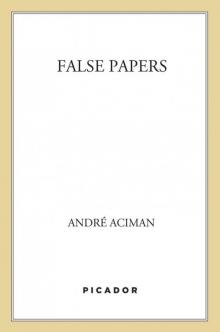 False Papers
False Papers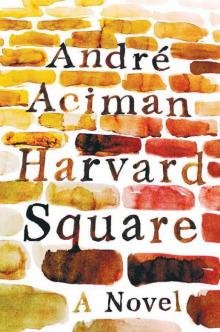 Harvard Square
Harvard Square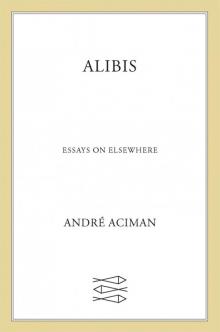 Alibis
Alibis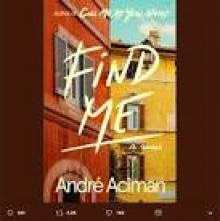 Find Me
Find Me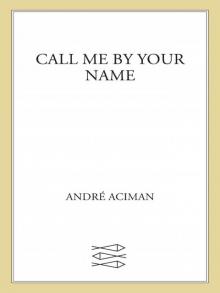 Call Me by Your Name
Call Me by Your Name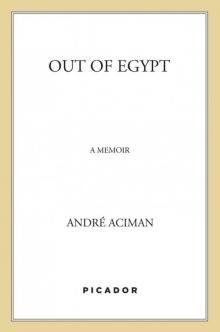 Out of Egypt: A Memoir
Out of Egypt: A Memoir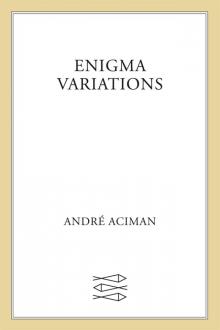 Enigma Variations
Enigma Variations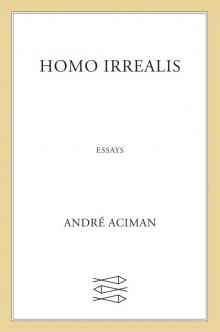 Homo Irrealis
Homo Irrealis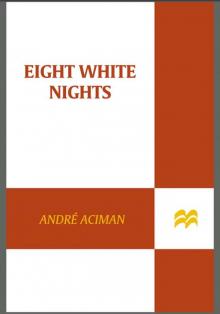 Eight White Nights
Eight White Nights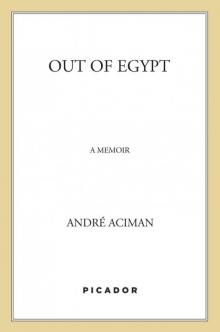 Out of Egypt
Out of Egypt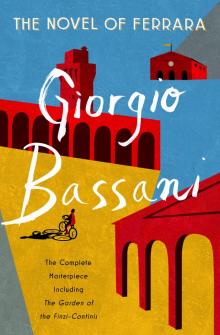 The Novel of Ferrara
The Novel of Ferrara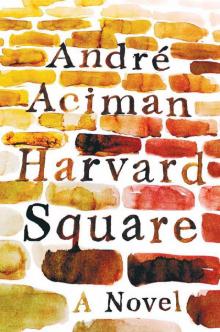 Harvard Square: A Novel
Harvard Square: A Novel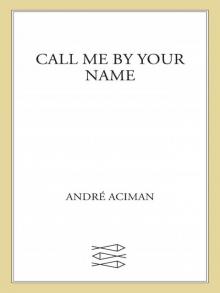 Call Me by Your Name: A Novel
Call Me by Your Name: A Novel